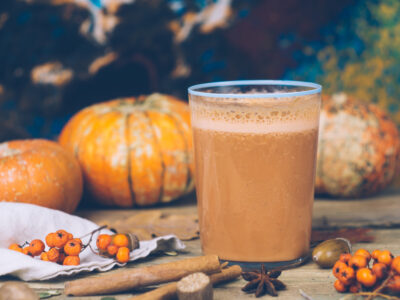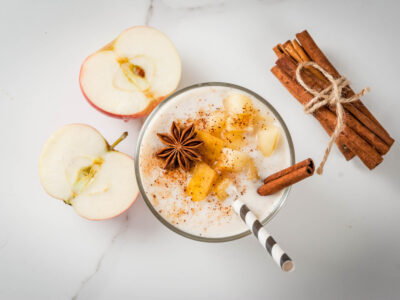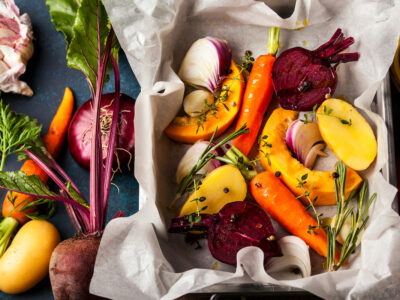Table of Contents[Hide][Show]
- Your Gut Microbiome
Tips for a Smooth Seasonal Transition for Your Gut+−
- Eat the Right Foods
- Gradually Adjust Your Diet
- 5 Easy and Healthy Fall Recipes That Won’t Cause Bloat
- Get More Sunlight
- Add Vitamin D
- Your Complete Guide to Vitamin K2 (MK-7)
- Keep Stress in Check
- Prioritize Probiotics and Prebiotics
- 7 Fall Smoothies For Gut Health
- Fall Cleaning (for Your Home and Life!)
- How to Eat Seasonally in the Winter
The transition from summer to fall brings changes everywhere: your wardrobe, decor, go-to dishes, and routines might all shift into coziness.
But there’s one place you may not have expected to feel those changes: your gut.
Changes to your diet, your lifestyle, even getting less sunlight—these changes can all influence your microbiome, and your overall health.
Let’s take a look at how you can make these seasonal shifts work for you and keep your gut feeling balanced all year-round.
Your Gut Microbiome
Before we look at how seasonal shifts affect your gut and what you can do to keep your microbiome balanced, let’s take a quick look at what makes for a healthy gut.
Your body is already home to trillions of bacteria. They can live on your skin, in your nasal cavities, in your mouth, and, most importantly, in your gut microbiome. But this isn’t a bad thing; the right bacteria can actually keep you healthy.
Beneficial (“good”) bacteria can promote digestion, balance your immune response, boost your mood, and improve your overall physical, emotional, and mental health. Pathogenic (“bad”) bacteria, however, can wreak havoc across your entire body, negatively affecting everything from your digestive and immune systems to your mental health. Even your skin can be affected by pathogenic bacteria, resulting in eczema and other skin issues.
Because your microbiome has a limited amount of real estate, when one type of bacteria flourishes, the other is crowded out. Ideally, and for optimal health, your gut will be populated by thriving colonies of beneficial bacteria.
As the seasons shift and summer turns to fall, here are some habits and routines that will support your beneficial bacteria and keep your whole body healthy.
How the Summer-to-Fall Transition Affects Your Gut
Sweater weather isn’t just about aligning your wardrobe. As the calendar moves from summer’s light to winter’s slower pace, everything from the foods you naturally choose to the amount of sunlight you absorb begins to shift, too.
These seasonal changes affect your whole body, including the trillions of bacteria living in your gut. Let’s explore some of these changes and how they could impact your health.
Dietary Shifts
One of the clearest ways to see the seasons show up in your gut health is through food.
In the summer, the heat naturally drives most of us towards lighter, more refreshing foods. Fresh fruits and colorful vegetables like watermelon, leafy salads, bell peppers, berries, cucumbers, and other summer produce are loaded with fiber and polyphenols. These plant compounds act as fuel for beneficial gut bacteria and keep your microbiome healthy and diverse.
But in autumn, cozy comfort foods take over: pumpkin loaves, root vegetables, and thick, hearty soups and stews.
The result? Digestive challenges.
Eating fewer fiber-rich, hydration-heavy fruits and vegetables can slow motility, leading to issues such as constipation, abdominal pain, and nausea. At the same time, heavier, richer meals can cause gas and bloating.
But that doesn’t mean that all fall foods are bad for you. They can still be great for your gut—if you eat with intention and lean into the healthier side of comfort foods.
Related
Supporting Your Digestion in the Winter
Learn how to support your digestion this winter with simple diet and lifestyle tips. Stay healthy and comfortable despite the cold weather and comfort foods.
Reduced Sunlight
Surprisingly, one of the biggest seasonal shifts for your gut doesn’t come from your plate; it comes from the sun.
During long, bright summer days, you likely soak up plenty of sunlight, whether it’s from going to the beach, spending more time outdoors, or just naturally getting more light throughout your usual routine. Sunlight helps your body produce vitamin D, which supports calcium absorption and helps build stronger teeth and bones.
But vitamin D does much more. It also plays a significant role in supporting your immune health. When vitamin D levels start to drop in the fall, it can subtly alter the composition of your gut microbiome.
And the effects aren’t limited to digestive issues. With over 70% of your immune system located in your gut, the lack of vitamin D can also cause immune issues, including increased inflammation and a higher susceptibility to illness or infection.
Mood Shifts
The sun also affects your gut through your mood. Shorter days and fewer hours of light can lower your mood and energy, especially if you experience Seasonal Affective Disorder (SAD).
Your gut and your brain are in constant communication through the gut-brain axis. When either of them is in less-than-stellar health, it can have negative effects on the other. This strong connection is why being nervous about an important event can cause an upset stomach, and, conversely, why stomach issues can lead to anxiety or depression.
So, if you’re sensitive to reduced sunlight, it can affect both your mindset and your microbiome.
Lifestyle Changes
The subtle changes to your routine in autumn can also have an impact on gut health.
When the mercury falls, so does the amount of time many people spend outdoors. This means you’ll have fewer chances to interact with the natural world and the microbes that inhabit it.
The bacteria found in soil, plants, and even fresh air can be good for your microbiome, adding a rich diversity that creates balance. When you’re snuggled up indoors, that bacterial variety decreases, making it more difficult for your gut to maintain its balance.
Fall can also be a stressful month. Kids are back to school, workplaces are often racing to complete projects before the end of the year, and the holidays are just around the corner. Whew!
Through the gut-brain axis we mentioned earlier, this seasonal stress can also impact your gut health, sometimes leading to bloating, discomfort, and other digestive issues.
Tips for a Smooth Seasonal Transition for Your Gut
Now that you’re aware of just how seasonal transitions can affect your gut, let’s look at what you can do to make sure your gut is in tip-top shape throughout the fall—and beyond.
Eat the Right Foods
No, you don’t have to give up your pumpkin spice muffins or stomach-warming soups completely.
Your microbiome actually likes variety, so seasonal eating can work in your favor. The key is to be intentional in your choices. Swap your summer salads and bowls of refreshing fruit for root vegetables, squash, citrus, dark leafy greens, and other seasonal produce to keep your beneficial bacteria thriving.
Gradually Adjust Your Diet
The sudden shift from summer’s light, hydrating meals to fall’s heavier, carb-loaded dishes can be a shock to your gut, temporarily disrupting the balance of your microbiome. Switch up your diet too quickly, and you could notice bloating, irregular digestion, or even a dip in your energy levels.
Ease into fall eating by mixing in new seasonal produce and your favorite cozy meals slowly, giving your gut bacteria time to adjust.
Related
5 Easy and Healthy Fall Recipes That Won’t Cause Bloat
Rejoice, gassy people, because here are the best healthy and delicious fall recipes that won’t cause constipation or bloating!
Get More Sunlight
Head outside, even when it’s cloudy or chilly.
- Every drop of sunshine can help reset your circadian rhythm, which is crucial for good sleep. And sleeping well supports a healthy gut.
- More sunlight = elevated mood and a reduced risk of seasonal depression. And as we’ve discussed, through the gut-brain connection, this means a healthier mood and a healthier gut, both.
If the cold weather or short days are keeping you from getting enough sunlight, talk to your healthcare provider about light therapy during the fall and winter.
Add Vitamin D
Shorter, darker days in the fall don’t just affect your mood. They also lower your vitamin D levels, which in turn can influence everything from immunity to your digestive system. Making the extra effort to spend time in the sun helps; even a quick walk on a sunny afternoon can make a difference!
You can also get some of your vitamin D through foods like fatty fish, red meat, liver, egg yolks, and fortified dairy products. Unfortunately, these foods typically don’t contain enough of this crucial nutrient to cover your body’s needs. A supplement can be a better, easier option for keeping your vitamin D levels strong and steady.
We recommend Just Thrive Vitamin K2-7 Plus D3, which uses the same form of vitamin D (D3) that your body makes from sunlight. D3 helps strengthen bones, muscles, and teeth while also supporting your immune health and energy levels. The easy-to-take capsule also includes vitamin K2-7, a nutrient that plays a key role in cardiovascular, bone, and brain health. Beyond your gut and immune system, Just Thrive Vitamin K2-7 plus D3 can support your well-being, physically and mentally, from summer to fall and all year long.
Related
Your Complete Guide to Vitamin K2 (MK-7)
Learn how vitamin K2 MK7 differs from vitamin K1 and discover its functions and benefits, signs of deficiency, and how you can incorporate it into your daily diet.
Keep Stress in Check
Fall conjures images of themed mood boards and cozy Instagram reels encouraging you to embrace a slower lifestyle. But the reality can be much different. Autumn often brings a flurry of activity: getting kids ready for back-to-school, project deadlines at work, and the start of holiday decorating, cleaning, and shopping.
But as we’ve seen, the gut-brain axis transfers that mental state to someplace you might not have expected, your gut microbiome. Stress can interfere with your gut balance and disturb the beneficial bacteria, with ripple effects that include everything from digestive troubles to skin issues.
Here are some tips to reduce stress and go from chaos to calm this fall:
- Try mentally soothing activities such as meditating, journaling, and practicing gratitude.
- Move your body: dance, exercise, or go for a brisk walk.
- Spend time enjoying nature.
- Remind yourself that it’s okay to say “no” when you’re feeling overloaded or need some down time.
- Add a clinically-proven psychobiotic to your daily routine for stress and mood support. We recommend Just Calm because it contains the heavily researched and scientifically-verified strain, Bifidobacterium longum 1714™, as well as 3 brain-nourishing B vitamins.
Once your mind is steady, your gut will be, too.
Prioritize Probiotics and Prebiotics
Prioritizing foods rich in probiotics and prebiotics can also help the seasonal shift work in your gut’s favor.
Probiotics are live bacteria similar, or even identical, to the beneficial bacteria already living in your gut. Consuming probiotics through food, drinks, and especially high-quality supplements supports and helps balance your microbiome. Probiotics can most often be found in fermented foods and beverages such as kefir, kimchi, kombucha, miso, sauerkraut, tempeh, and yogurt.
Prebiotics are equally important. These fibers feed the good bacteria already living in your gut, helping strengthen their numbers. Prebiotics can be found in foods like almonds, asparagus, bananas, garlic, onion, raw leafy greens, and whole grains.
Of course, these foods may not appeal to you. You may not eat them often enough, or in enough quantity. Or you simply might prefer not to include them in your diet.
Supplements can take the guesswork out of your diet, making it simple and easy for you to support your gut not just in the fall, but all year.
Just Thrive Probiotic is formulated with four unique, proprietary strains of clinically-proven spore probiotics.
- Bacillus Coagulans helps your body overcome digestive issues.
- Bacillus Subtilis HU58™ promotes a healthy immune system, producing 12 potent defenders against bacteria and other harmful microbes.
- Bacillus Clausii helps your body restore and maintain optimal bacterial balance.
- Bacillus Indicus HU36™ helps your body create antioxidants where they’re most bioavailable, right in your gut.
With its tough endospore shell, Just Thrive Probiotic is guaranteed to “arrive alive” in your gut, where it gets straight to work enhancing your digestive health, supporting your immune system, and promoting your overall well-being. You can take it in capsule form, or sprinkle its odorless, tasteless contents into your favorite fall foods or beverages. There’s even a gummy option with the same great formula.
With three “smart” fibers that feed only beneficial bacteria, Just Thrive PREbiotic is the ideal complement to Just Thrive Probiotic. Together, they can more than double the population of good bacteria in your gut microbiome, supporting healthy digestion and immunity. (You can pick up both with bundled savings here.)
Final Thoughts
As the seasons shift, your gut feels those changes right along with you.
From diet and daily routines to sunlight and stress, fall has the potential to throw your gut bacteria off course. But it can also be your chance to strengthen your microbiome, immunity, and overall well-being.
By being mindful of what you eat, how you manage stress, and your daily habits, you can keep your gut balanced and thriving well past sweater season.
You May Also Like…







